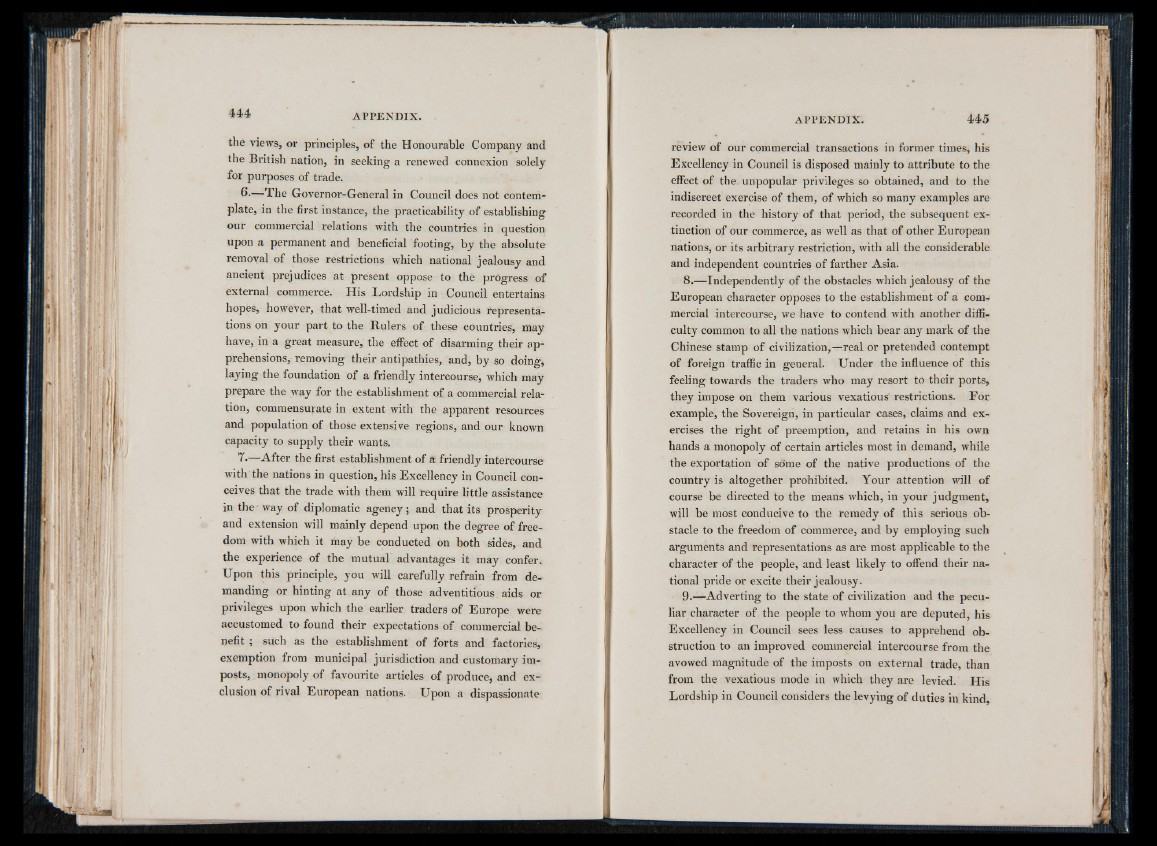
the views, or principles, o f the Honourable Company and
the British nation, in seeking a renewed connexion solely
for purposes o f trade.
6-— The Governor-General in Council does not contemplate,
in the first instance, the practicability o f establishing
our commercial relations with the countries in question
upon a permanent and beneficial footing, by the absolute
removal o f those restrictions which national jealousy and
ancient prejudices at present oppose to the progress of
external commerce. His Lordship in Council entertains
hopes, however, that well-timed and judicious representations
on your part to the Rulers o f these countries, may
have, in a great measure, the effect o f disarming their apprehensions,
removing their antipathies, and, by so doing,
laying the foundation o f a friendly intercourse, which may
prepare the way for the establishment o f a commercial relation,
commensurate in extent with the apparent resources
and population o f those extensive regions, and our known
capacity to supply their wants.
7.—After the first establishment of a friendly intercourse
with the nations in question, his Excellency in Council conceives
that the trade with them will require little assistance
in the way of diplomatic agency; and that its prosperity
and extension will mainly depend upon the degree of freedom
with which it may be conducted on both sides, and
the experience of the mutual advantages it may confer.
Upon this principle, you will carefully refrain from demanding
or hinting at any of those adventitious aids or
privileges upon which the earlier traders o f Europe were
accustomed to found their expectations o f commercial benefit
; such as the establishment of forts and factories,
exemption from municipal jurisdiction and customary imposts,
monopoly of favourite articles of produce, and exclusion
o f rival European nations. Upon a dispassionate;
review of our commercial transactions in former times, his
Excellency in Council is disposed mainly to attribute to the
effect of the. unpopular privileges so obtained, and to the
indiscreet exercise o f them, o f which so many examples are
recorded in the history of that period, the subsequent extinction
of our commerce, as well as that of other European
nations, or its arbitrary restriction, with all the considerable
and independent countries o f farther Asia.
8 .— Independently of the obstacles which jealousy of the
European character opposes to the establishment o f a commercial
intercourse, we have to contend with another difficulty
common to all the nations which bear any mark o f the
Chinese stamp of civilization,—real or pretended contempt
o f foreign traffic in general. Under the influence of this
feeling towards the traders who may resort to their ports,
they impose on them various vexatious restrictions. For
example, the Sovereign, in particular cases, claims and exercises
the right of preemption, and retains in his own
hands a monopoly of certain articles most in demand, while
the exportation o f some o f the native productions o f the
country is altogether prohibited. Your attention will of
course be directed to the means which, in your judgment,
will be most conducive to the remedy of this serious obstacle
to the freedom o f commerce, and by employing such
arguments and representations as are most applicable to the
character of the people, and least likely to offend their national
pride or excite their jealousy.
9.— Adverting to the state o f civilization and the peculiar
character of the people to whom you are deputed, his
Excellency in Council sees less causes to apprehend obstruction
to an improved commercial intercourse from the
avowed magnitude of the imposts on external trade, than
from the vexatious mode in which they are levied. His
Lordship in Council considers the levying of duties in kind,